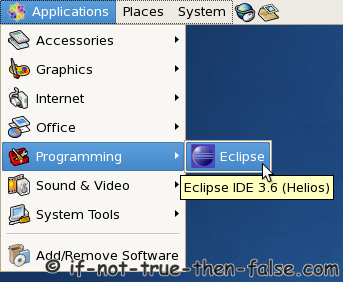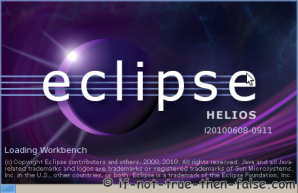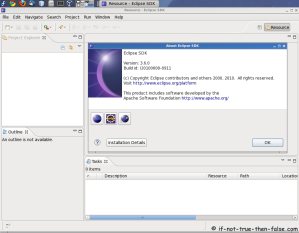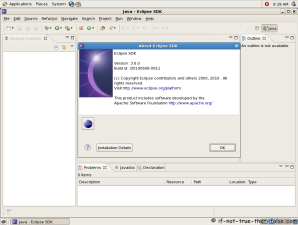# yum install eclipse-platform
Installed:
eclipse-platform.i386 1:3.2.1-19.el5.centos
Dependency Installed:
ant-antlr.i386 0:1.6.5-2jpp.2 ant-apache-bcel.i386 0:1.6.5-2jpp.2 ant-apache-log4j.i386 0:1.6.5-2jpp.2
ant-apache-oro.i386 0:1.6.5-2jpp.2 ant-apache-regexp.i386 0:1.6.5-2jpp.2 ant-apache-resolver.i386 0:1.6.5-2jpp.2
ant-commons-logging.i386 0:1.6.5-2jpp.2 ant-javamail.i386 0:1.6.5-2jpp.2 ant-jdepend.i386 0:1.6.5-2jpp.2
ant-jsch.i386 0:1.6.5-2jpp.2 ant-junit.i386 0:1.6.5-2jpp.2 ant-nodeps.i386 0:1.6.5-2jpp.2
ant-swing.i386 0:1.6.5-2jpp.2 ant-trax.i386 0:1.6.5-2jpp.2 classpathx-jaf.i386 0:1.0-9jpp.1
eclipse-rcp.i386 1:3.2.1-19.el5.centos jdepend.i386 0:2.6-6jpp.2 jsch.i386 0:0.1.28-1jpp.5
junit.i386 0:3.8.2-3jpp.1 jzlib.i386 0:1.0.7-4jpp.1 libswt3-gtk2.i386 1:3.2.1-19.el5.centos
Complete!
++++++++++++++++++++++++++++++++++++++++++++++
howto install latest Eclipse SDK 3.7.2 (Indigo) on Fedora, CentOS and Red Hat (RHEL). This guide should work with Fedora 16/15/14/13/12, CentOS 6.2/6.1/6/5.8 and Red Hat (RHEL) 6.2/6.1/6/5.8 and even with earlier versions.
Eclipse is a multi-language software development environment comprising an integrated development environment (IDE) and an extensible plug-in system. It is written primarily in Java and can be used to develop applications in Java and, by means of various plug-ins, other languages including C, C++, COBOL, Python, Perl, PHP, Scala and Ruby (including Ruby on Rails framework).
Install Sun/Oracle Java JDK 6 on Fedora, CentOS, Red Hat (RHEL)
From Desktop menu Gnome 3 Eclipse 3.7.2

From Desktop menu Gnome 2 and Eclipse 3.6 (Helios)


Eclipse 3.6 running on Fedora 13 32-bit

Eclipse 3.6 running on CentOS 5.5 64-bit

Or
/usr/java/jdk1.6.0_21/jre/bin/../lib/i386/client/libjvm.so: cannot enable executable stack as shared object requires: Permission denied
Then do following:
Installed:
eclipse-platform.i386 1:3.2.1-19.el5.centos
Dependency Installed:
ant-antlr.i386 0:1.6.5-2jpp.2 ant-apache-bcel.i386 0:1.6.5-2jpp.2 ant-apache-log4j.i386 0:1.6.5-2jpp.2
ant-apache-oro.i386 0:1.6.5-2jpp.2 ant-apache-regexp.i386 0:1.6.5-2jpp.2 ant-apache-resolver.i386 0:1.6.5-2jpp.2
ant-commons-logging.i386 0:1.6.5-2jpp.2 ant-javamail.i386 0:1.6.5-2jpp.2 ant-jdepend.i386 0:1.6.5-2jpp.2
ant-jsch.i386 0:1.6.5-2jpp.2 ant-junit.i386 0:1.6.5-2jpp.2 ant-nodeps.i386 0:1.6.5-2jpp.2
ant-swing.i386 0:1.6.5-2jpp.2 ant-trax.i386 0:1.6.5-2jpp.2 classpathx-jaf.i386 0:1.0-9jpp.1
eclipse-rcp.i386 1:3.2.1-19.el5.centos jdepend.i386 0:2.6-6jpp.2 jsch.i386 0:0.1.28-1jpp.5
junit.i386 0:3.8.2-3jpp.1 jzlib.i386 0:1.0.7-4jpp.1 libswt3-gtk2.i386 1:3.2.1-19.el5.centos
Complete!
++++++++++++++++++++++++++++++++++++++++++++++
howto install latest Eclipse SDK 3.7.2 (Indigo) on Fedora, CentOS and Red Hat (RHEL). This guide should work with Fedora 16/15/14/13/12, CentOS 6.2/6.1/6/5.8 and Red Hat (RHEL) 6.2/6.1/6/5.8 and even with earlier versions.
Eclipse is a multi-language software development environment comprising an integrated development environment (IDE) and an extensible plug-in system. It is written primarily in Java and can be used to develop applications in Java and, by means of various plug-ins, other languages including C, C++, COBOL, Python, Perl, PHP, Scala and Ruby (including Ruby on Rails framework).
Install Eclipse SDK 3.7.2 (Indigo) on Fedora, CentOS, Red Hat (RHEL)
1. Install Sun/Oracle Java JDK 7 or Java JDK 6
Install Sun/Oracle Java JDK 7 on Fedora, CentOS, Red Hat (RHEL)Install Sun/Oracle Java JDK 6 on Fedora, CentOS, Red Hat (RHEL)
2. Download Eclipse SDK 3.7.2 (Indigo)
Download suitable version from www.eclipse.org/downloads. This guide uses Eclipse Classic 3.7.2 version. Another popular versions are Eclipse IDE for Java EE Developers, Eclipse IDE for Java Developers and Eclipse for PHP Developers. Select also 32-bit or 64-bit version depending on your system.3. Change root user
su -
## OR ##
sudo -i
4. Extract Eclipse package (example to /opt directory)
## x86 - 32-bit ##
tar -xvzf eclipse-SDK-3.7.2-linux-gtk.tar.gz -C /opt
## x86_64 - 64-bit ##
tar -xvzf eclipse-SDK-3.7.2-linux-gtk-x86_64.tar.gz -C /opt
5. Add read permissions to all files
chmod -R +r /opt/eclipse
6. Create Eclipse executable on /usr/bin path
touch /usr/bin/eclipse
chmod 755 /usr/bin/eclipse
## Open eclipse file with your favourite editor ##
nano -w /usr/bin/eclipse
## Paste following content to file ##
#!/bin/sh
export ECLIPSE_HOME="/opt/eclipse"
$ECLIPSE_HOME/eclipse $*
7. Create Gnome desktop launcher
## Create following file, with our favourite editor ##
/usr/share/applications/eclipse.desktop
## Add following content to file and save ##
[Desktop Entry]
Encoding=UTF-8
Name=Eclipse
Comment=Eclipse SDK 3.7.2
Exec=eclipse
Icon=/opt/eclipse/icon.xpm
Terminal=false
Type=Application
Categories=GNOME;Application;Development;
StartupNotify=true
8. Start Eclipse 3.7.2
From command line use eclipse commandeclipse

From Desktop menu Gnome 2 and Eclipse 3.6 (Helios)

9. Eclipse 3.6 screenshots, running (and starting) on Fedora 13 32-bit and CentOS 5.5 64-bit
Eclipse loading
Eclipse 3.6 running on Fedora 13 32-bit

Eclipse 3.6 running on CentOS 5.5 64-bit

Troubleshooting
If you get something like following errors:
Failed to load the JNI shared library /usr/java/jdk1.6.0_21/jre/bin/../lib/i386/client/libjvm.soOr
/usr/java/jdk1.6.0_21/jre/bin/../lib/i386/client/libjvm.so: cannot enable executable stack as shared object requires: Permission denied
Then do following:
chcon -t execmem_exec_t '/opt/eclipse/eclipse'
No comments:
Post a Comment